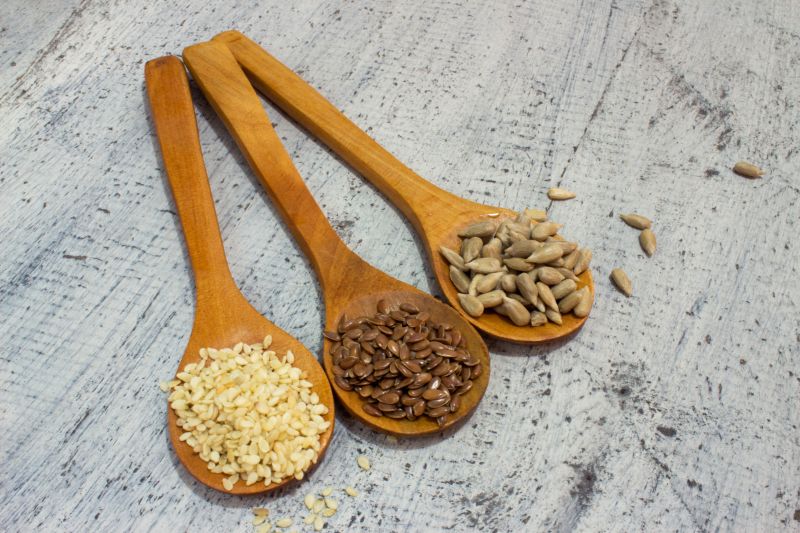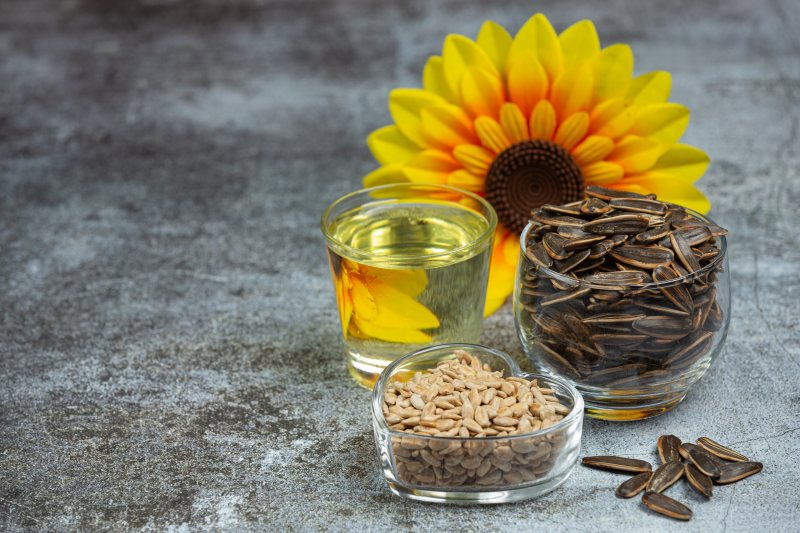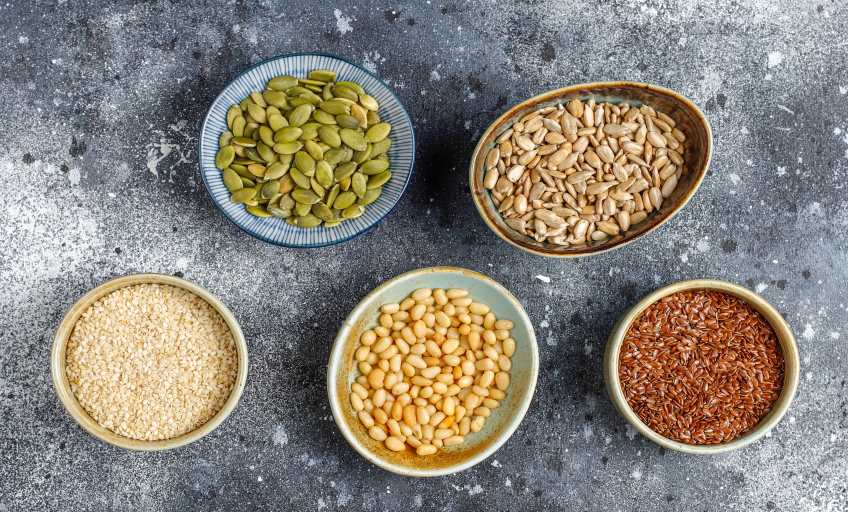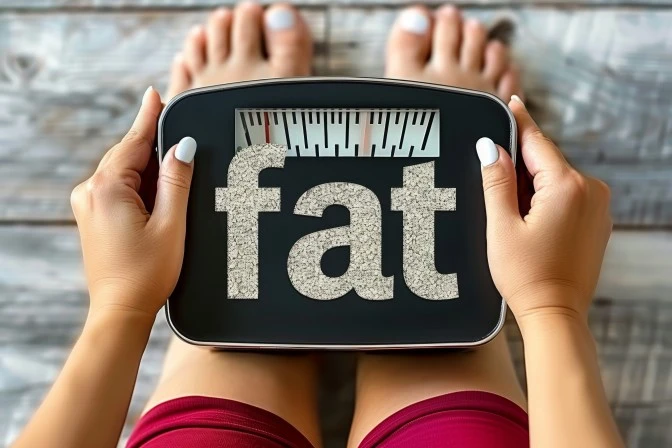
Have you heard of seed cycling? It is a growing practise that claims to balance hormones, boost fertility, and ease menopause symptoms. In this practise, you eat flax, pumpkin, sesame, and sunflower seeds at different times monthly. However, scientific evidence to back its claims is lacking despite its purported usefulness.
What is seed cycling?

Seed cycling is the rotation of different edible seeds into the diet at various times in the menstrual cycle. Practitioners believe that eating these seeds at the correct cycle times will balance the hormonal rhythm, as some seeds promote estrogen production, and others promote progesterone production.
The concept of seed cycling
It balances hormones like estrogen and progesterone by leveraging the nutrients found in each seed type, regulating menstrual cycles and alleviating symptoms like PMS. This is considered an alternative medicine approach with limited scientific evidence to support its claims fully.
The seed cycle
The claims backing seed cycling are inconsistent. However, the primary idea is that different seeds can promote or hinder the estrogen and progesterone hormones. Here are the two seed cycle phases:
Phase 1:
In a typical cycle, estrogen is produced in the first 14 days of the follicular phase, when the ovarian eggs ripen. Follicle-stimulating hormone (FSH) and luteinizing hormone (LH) levels rise just before ovulation, and estrogen drops after ovulation.
The most common method instructs women to eat freshly ground flax and pumpkin seeds, one tablespoon each, daily in the follicular phase.
Phase 2:

Once an egg has been released, the second half of the cycle—the luteal phase—starts. Progesterone and estrogen gradually increase in a careful balance, supporting conception and implantation. If no implantation occurs, they drop again before the next period.
During the luteal phase, seed cyclers eat ground sunflower and sesame seeds, one tablespoon each daily, until the first day of the next period, when their cycle restarts. If you stay consistent, you may observe positive hormonal changes in just a few months.
The science behind seed cycling
Seed cycling balances estrogen and progesterone through phytoestrogens, zinc, selenium, and vitamin E.
Hormonal influence
Phytoestrogens (compounds in plants that mimic the action of estrogen) in flax seeds should help increase or decrease estrogen levels as needed during the follicular phase. Also, zinc from pumpkin seeds is claimed to promote progesterone production in preparation for the cycle’s next phase. Lignans, a type of polyphenol in sesame, inhibit estrogen levels from increasing too much in the luteal phase. At the same time, the vitamin E in sunflower seeds helps boost progesterone levels.
Potential benefits
Seeds have health benefits, including:
- Regulating periods
- Reducing acne
- Treating polycystic ovarian syndrome (PCOS), endometriosis, and infertility
- Easing symptoms of menopause, such as fatigue, hot flashes, and mood swings
- Maximizing the influx of vitamins and minerals
- Lowering the risk of certain cancers
- Reducing inflammation, cholesterol, and blood sugar levels.
Some online sources state that they can enhance thyroid hormone levels, hair health, weight loss, water retention, and cellulite.
Considerations before seed cycling
Before seed cycling, regulate your menstrual cycle, optimize hormone status, consider whether you have any sensitivities to certain seeds, track your ovulation accurately, and gradually increase your seed intake to avoid digestive discomfort. Consume seeds raw and freshly ground. Talk to a healthcare professional if you have any health concerns.
Individual variability
Individual responses to seed cycling may vary based on genetics, underlying health conditions, lifestyle factors, and hormonal imbalances. While many experience noticeable improvements in hormone balance and overall well-being quickly, others may require more time to see results. Be patient, attentive to your body’s signals, and open-minded about exploring additional strategies or adjustments.
Potential side effects
Seed cycling is generally safe but can cause the following side effects:
- Increased fiber intake from seeds can cause bloating, gas, or changes in bowel habits.
- Some people may be allergic to certain seeds.
- Changes in calorie density may cause weight changes.
- Some seeds, like flaxseeds, can interfere with blood thinner medications.
These side effects are usually mild and can be minimized by increasing your seed intake gradually.
Is seed cycling beneficial?
Many seeds are highly nutritious and offer several health benefits. The practise claims to balance certain hormones, boost fertility, and ease menopause symptoms. However, there is not enough evidence to back this. Nevertheless, eating seeds is still a great way to improve the quality of your diet and overall health.
Key Takeaways
- Seed cycling involves eating flax, pumpkin, sesame, and sunflower seeds at different times of the menstrual cycle.
- Eat one tablespoon each of flax and pumpkin seeds daily during the follicular phase and sesame and sunflower seeds during the luteal phase.
- Seed cycling helps with irregular periods, PCOS, and fertility.
- It can cause side effects like digestive discomfort, bloating, and gas.
Stay tuned to the Activ Living Community. Keep up to date with the latest health tips and trends through expert videos, podcasts, articles, and much more on nutrition, fitness, mindfulness, and lifestyle conditions like Asthma, Blood Pressure, Cholesterol, and Diabetes. Activ Living ke saath sahi sehat ki shuruat ABHI karo.
You may also be interested in the following blogs:
- Say Goodbye To Perimenopause Woes With These 3 Innovative Treatments
- Lifestyle Changes To Help With Impact Of Diabetes And Periods
Popular Searches
How to lower blood pressure | Fruits good for liver | Unhealthy foods | Ragi Benefits | Basal Metabolic Rate | Acupressure points for High Blood Pressure | Ayurvedic medicine for blood pressure | How to control cholesterol at home | Homeopathy for Asthma | Biological Age | Home remedies for TB | Natural beta blockers | Negative effects of internet | Types of walking | Blood pressure calculator | Blood sugar calculator | BMI Calculator





 1800-270-7000
1800-270-7000







Thanks to the team who is writing such informative content- really getting a lot to learn. Insurance is no longer a risk absorbing tool, but a platform that makes you evolve with learning.